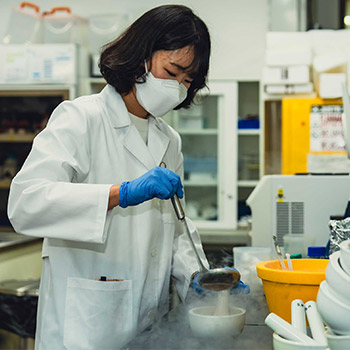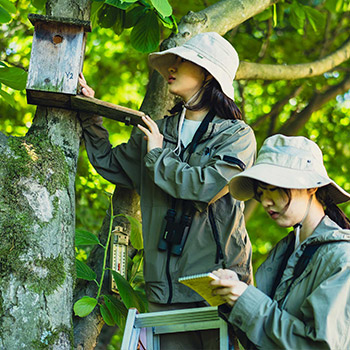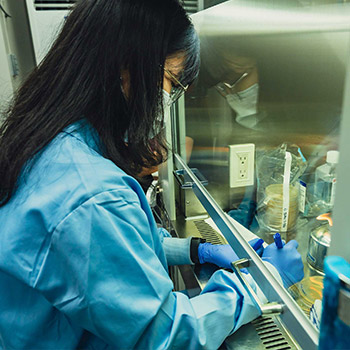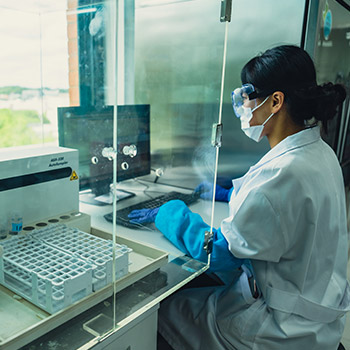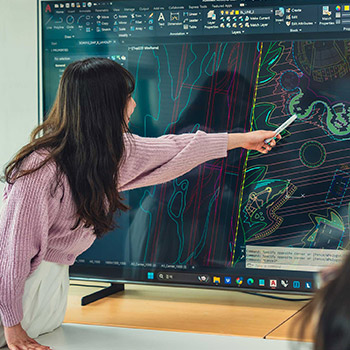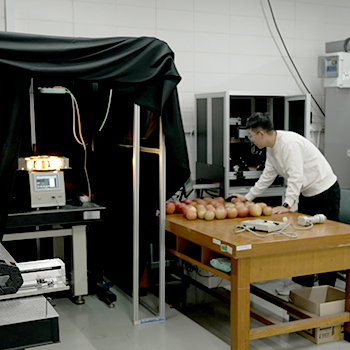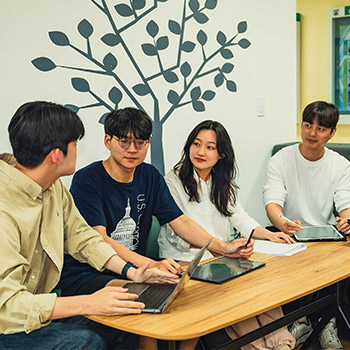Department of Biosystems & Biomaterials Science and Engineering
The Department of Biosystems & Biomaterials Science and Engineering is an exciting field that fuses engineering, biology and biotechnology into two cutting edge programs: biosystem engineering and biomaterials engineering.
In the 21st century, bio-related technologies are predicted to lead science and technology research. Accordingly, qualified people equipped with knowledge in both engineering and biotechnology are in high demand. The Department of Biosystems and Biomaterials Science and Engineering applies electric and electronic engineering, nanotechnologies, materials engineering, mechanical engineering and bioinformatics technology to biological products and materials.
The biosystems engineering program has branches in biomechanics, bio-processing, bio-production engineering, bio-environmental engineering, biosensors, and bioinformatics. The program’s research and education goals emphasize the development and optimization of biosystems. The extensive interdisciplinary research and excellent education programs will give much-needed vision to future leaders in bio-related technology, as well as unlimited prospects for scientists and engineers in both education and industry.
The biomaterials engineering program, based on biotechnology and materials engineering, focuses its research and education on the development of environmentally friendly biodegradable materials and new biomaterials, including those used for artificial organs, biochips, and many other unique applications.
In the 21st century, bio-related technologies are predicted to lead science and technology research. Accordingly, qualified people equipped with knowledge in both engineering and biotechnology are in high demand. The Department of Biosystems and Biomaterials Science and Engineering applies electric and electronic engineering, nanotechnologies, materials engineering, mechanical engineering and bioinformatics technology to biological products and materials.
The biosystems engineering program has branches in biomechanics, bio-processing, bio-production engineering, bio-environmental engineering, biosensors, and bioinformatics. The program’s research and education goals emphasize the development and optimization of biosystems. The extensive interdisciplinary research and excellent education programs will give much-needed vision to future leaders in bio-related technology, as well as unlimited prospects for scientists and engineers in both education and industry.
The biomaterials engineering program, based on biotechnology and materials engineering, focuses its research and education on the development of environmentally friendly biodegradable materials and new biomaterials, including those used for artificial organs, biochips, and many other unique applications.

Programs
Program in Biosystems Engineering
Biosystems engineering is a unique engineering field that deals with food, living organisms, and the environments. Biosystems engineers incorporate innovative technology (computer vision, remote sensing, GPS, GIS, robotics, and control engineering) into the production and utilization of biological resources such as plants and livestock, the development of biosensors, and biomedical engineering applications. Biosystems engineers are well aware of the necessities of life: a source of safe food, pure water to drink, clean fuel and energy resources, and a safe and healthy environment in which to live. In order to supply these necessities, biosystems engineers apply engineering principles to many processes associated with the production of agricultural products and the management of natural resources.
The biosystems engineering major deals with engineering-based technologies required for the development of equipment and systems used for the production, processing, storage, transportation, management and utilization of agricultural products by applying modern engineering technologies such as machinery, electrical and electronic engineering, and computer technology. This program will contribute tremendously to the future agricultural, livestock, and food industries by training highly qualified engineers well-equipped with knowledge of both biosystems and engineering.
Biosystems engineers has increased the competitiveness of our farms through the mechanization of agriculture during the industrialization period. This field has been evolving into a unique academic arena in which engineering skills are applied not only to agriculture, but also to general biological systems, in accordance with the recent development of bio-engineering. Teaching and research topics covered in the biosystems engineering major are farm power and automation, off-road equipment design, plant production machinery, agricultural processing systems, engineering properties of biomaterials, electronics and sensors, and bioprocessing systems.
Current high valued research is being conducted on cereal and fruit processing systems, agricultural robotics, biosensors, image processing applications, artificial intelligence applications, environmental friendly precision farming, bioprocessing system development, and farm machinery design via computer technology. Collaborations are conducted with various related areas such as horticulture, animal science, food science, and forest products.
The biosystems engineering major deals with engineering-based technologies required for the development of equipment and systems used for the production, processing, storage, transportation, management and utilization of agricultural products by applying modern engineering technologies such as machinery, electrical and electronic engineering, and computer technology. This program will contribute tremendously to the future agricultural, livestock, and food industries by training highly qualified engineers well-equipped with knowledge of both biosystems and engineering.
Biosystems engineers has increased the competitiveness of our farms through the mechanization of agriculture during the industrialization period. This field has been evolving into a unique academic arena in which engineering skills are applied not only to agriculture, but also to general biological systems, in accordance with the recent development of bio-engineering. Teaching and research topics covered in the biosystems engineering major are farm power and automation, off-road equipment design, plant production machinery, agricultural processing systems, engineering properties of biomaterials, electronics and sensors, and bioprocessing systems.
Current high valued research is being conducted on cereal and fruit processing systems, agricultural robotics, biosensors, image processing applications, artificial intelligence applications, environmental friendly precision farming, bioprocessing system development, and farm machinery design via computer technology. Collaborations are conducted with various related areas such as horticulture, animal science, food science, and forest products.

Faculty
| Name | Major | TEL | |
|---|---|---|---|
| Professor YONG-RO KIM |
Bioprocessing Systems | +82-2-880-4607 | yongro@snu.ac.kr |
| Professor Hak Jin Kim |
Biosystems Control and Precision Agiculture | +82-2-880-4604 | kimhj69@snu.ac.kr |
| Professor Kim Ghiseok |
Lab. of Physical Properties and Process Engineering of Agricultural Products | +82-2-880-4603 | ghiseok@snu.ac.kr |
| Associate Professor Joong Yong Rhee |
Bioenvironment Systems Engineering | +82-2-880-4605 | jyr@snu.ac.kr |
| Associate Professor Young-Jun Park |
Mobility Powertrain and Soil-Machine Systems | +82-2-880-4602 | yjpark95@snu.ac.kr |
| Assistant Proffesor Soo Chung |
Biosensor and Agricultural Electronics | +82-2-880-4606 | soochung@snu.ac.kr |
| Assistant Professor Taehyeong Kim |
Lab of Artificial Intelligence and Big Data for Agriculture | +82-2-880-4594 | taehyeong.kim@snu.ac.kr |
| Assistant Professor Sangbae Park |
Agricultural Biomechanics and Biological Engineering | +82-2-880-4601 | sb92park@snu.ac.kr |





